Watch the movie “Oppenheimer”: How close are we to the end of the world?
(You may listen to its audio by clicking on the Play arrow below.)
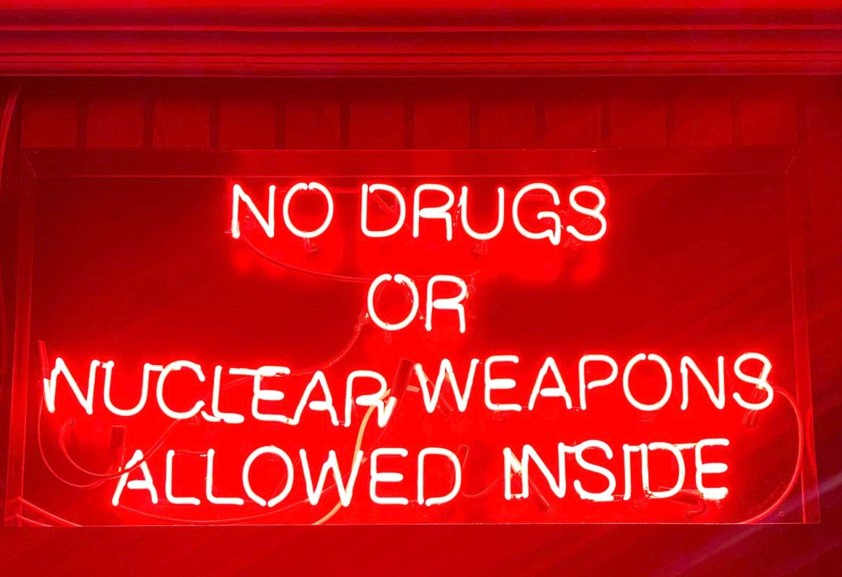
Taiwan and A.I.
What do Taiwan and Artificial Intelligence (A.I.) have in common? One rogue move and it marks the end of humanity as we know it.
This post has nothing to do with politics, local or global. When humanity’s existence is at stake, including my own precious life, politics is the last thing in my thought.
There has never been a time in my lifetime that something told me to trust our world leaders and benevolent technology experts like at this very moment. The present and future of the world are literally in their hands.
To understand a little bit more about how we got here, I am excited to watch the movie “Oppenheimer”, which opens tomorrow (July 21, 2023). This will refresh my historical knowledge about humanity’s quest for ways to make our lives better, and the constant dangers that go with every success.
It is my average knowledge of history that keeps me confident that any catastrophic event would not happen in my lifetime. That despite humanity’s seeming refusal to learn from their past mistakes, overall peace and stability would always prevail.
First World War
For example, it was believed that the First World War (1914-1918) was fought to settle things once and for all. Indeed, it was called “the war to end all wars”. True enough, the witnessed image and experience of human sufferings and destruction, the gruesome violence and death, were too horrible and horrifying that humanity must have learned from it. No more war of that magnitude.

Second World War
Then a little over 20 years after, the Second World War (1939-1945) broke out. Another human suffering and destruction on a global scale. The potential for more deaths was unimaginable. So much so that the US government, with the support of some allies like Britain and Canada, assembled a team of leading scientists to find a weapon that could end the war. Indeed, after two nuclear bombs were each dropped on the Japanese cities of Hiroshima and Nagasaki, the whole world breathed a sigh of relief. It was a necessary evil to end the war. At the expense of hundreds of thousands of Japanese lives.
The Cold War
But the world has created a monster. Soon, the technology to create a weapon capable of annihilating humanity spread to other countries. Specifically, it was the beginning of the so-called Cold War (1947-1991), between the USSR and the U.S. It was during this period where the world was put on edge as the two superpowers were engaged in the nuclear arms race. There was no way the genie could be put back into its bottle. There was no end in sight on the way to Armageddon.
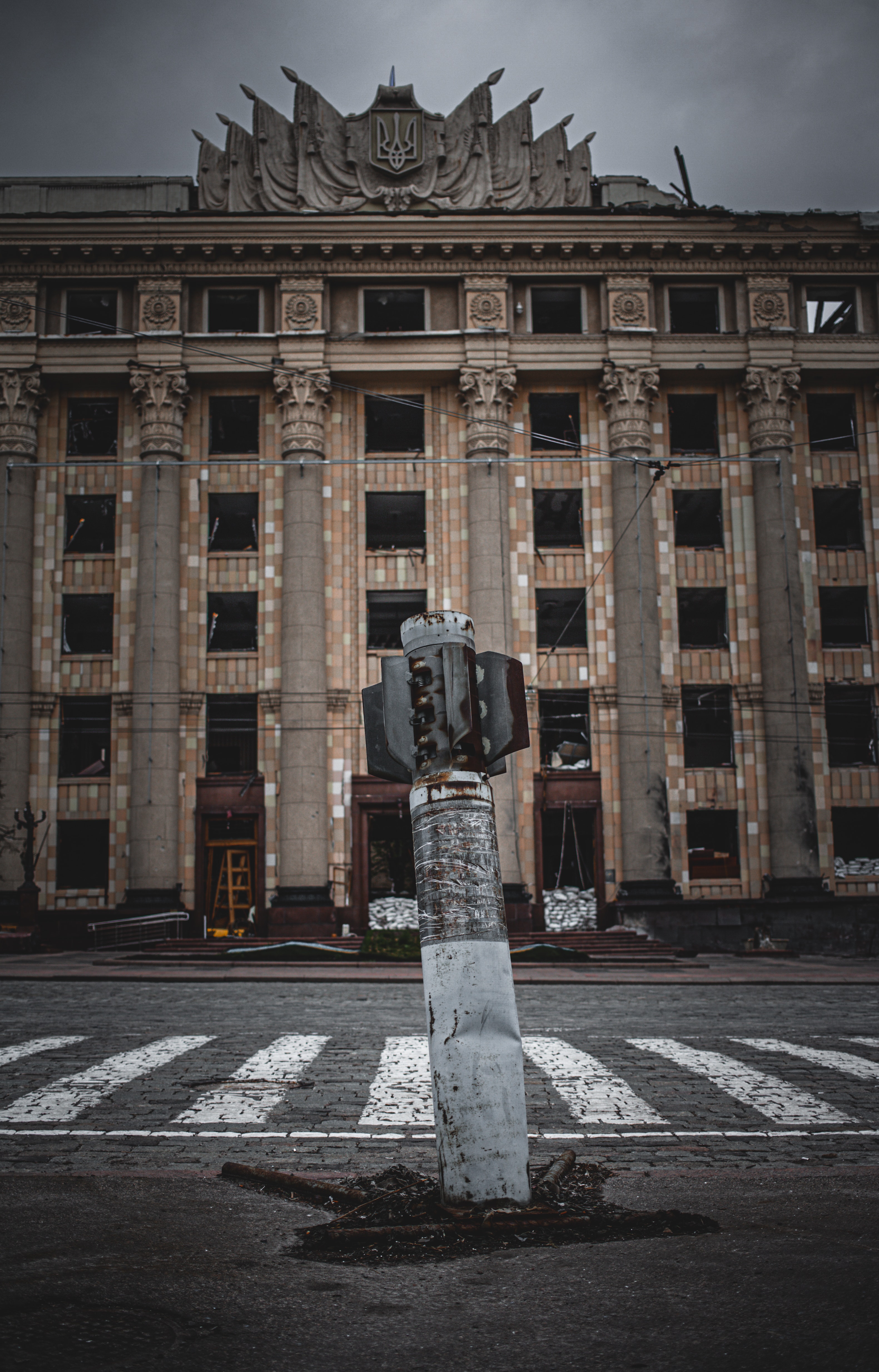
MAD
The end of the world during this era was so real, that a doctrine was invented in order to avoid it. It was called Mutually Assured Destruction (MAD), wherein in the event of a nuclear conflict there would be no winner left. Each was capable of finishing what one had started. Thus, world peace was maintained. Until USSR’s Mikhail Gorbachev and the US’s George H.W. Bush jointly declared the Cold War era over.
It does not mean, though, that during the MAD years the world would have a good night’s sleep every night. There were so many close calls.
The following examples were thought to be the start of the Third World War.
Close Calls
The Korean War (June 25, 1950 – July 27, 1953). The world was put on the brink of a full-scale war between the US and the USSR, and China.
The Berlin Crisis (June 4 – November 9, 1961). At a spot in the city of Berlin called Checkpoint Charlie, an array of American tanks and troops took their shooting positions just 100 yards from the Soviet/East German forces’ own tanks and troops. It was a very tense period.
Cuban Missile Crisis (October 15-29, 1962). Angered by the US-backed Bay of Pigs invasion in Cuba, the USSR had begun to station Soviet nuclear missiles on the island nation. It was a two-week stand-off that put the whole world closest to a nuclear conflict. It was so real that the American public had to constantly perform nuclear war emergency drills.
Sino-Soviet Border Conflict (March 2 – September 11, 1969). This isolated incident almost became a full-scale war between two giants USSR and China.
Yom Kippur War (October 6-25, 1973). The American (which supported Israel) and the Soviet (which sided with the Arab states) naval forces were hair-thinly close to firing at each other in the Mediterranean Sea.
Yes, those were close calls. However, there were other incidents which we thought to be seen only in movies. World War III almost started because of computer malfunction.
Computer glitch
For example, on November 9, 1979, the NORAD (North American Aerospace Defense Command) scrambled for an emergency retaliation preparation after its personnel saw on the computer screens that the Soviets had just launched a nuclear attack on US soil. Luckily, at the last second NORAD realized that a display error was caused by a computer system that had gone haywire.
And on September 26, 1983, the Soviet’s own nuclear early warning system detected a launch of an intercontinental ballistic missile from US bases. This world-altering false alarm caused the Soviets to prepare for a retaliatory attack. The doomsday ending was prevented at the last minute after it was found out there was a glitch on their computer.
And who can forget the January 2018 incident in Hawaii when a warning of an incoming missile attack was flashed to phones and televisions around the islands’ residents? There was widespread panic. It was later declared as false alarm.
Taiwan
However, today so many factors are emerging that this time things might be different from the recent past. Experts agree that if there is one flash point that has the real potential to trigger total world conflict, it is Taiwan. It is becoming a clear and present danger to our global order. And the situation is so complex, many experts do not have a clear pathway toward its resolution.
What is at stake?
Taiwan has become crucially important to both two superpowers, China and the US. In fact, some argue that with the fast-shifting geo-political power struggle, the small island nation is much more relevant to the US than any of its other geographical interests in the world. And China wants the same. And it already told the whole world that it is ready to take Taiwan by force. What does the picture look like? In the graphics below, we clearly understand why.
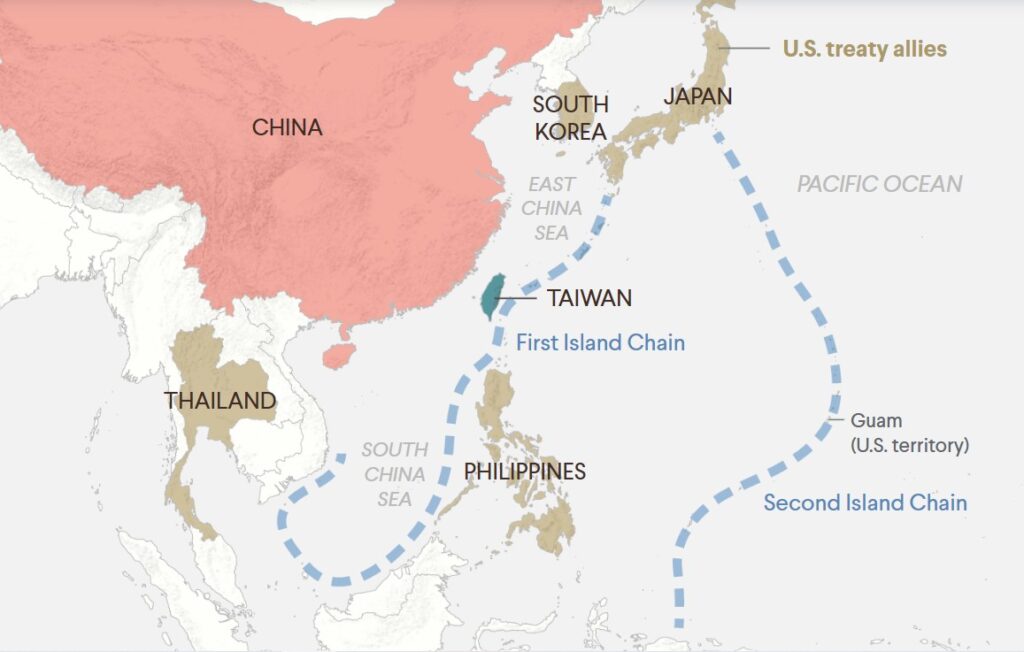
Geographic location
Taiwan sits right at the center around the countries that are “treaty allies” of the US: Thailand, Philippines, South Korea, and Japan.
The status quo means that the US is in an advantaged position to assure its allies that it has the capacity and the means to come to their assistance militarily if threatened by adversaries, like China and North Korea. This is one of the few main reasons China feels being hemmed in. (Do we still remember why Japan had to invade and occupy most of these territories at the early stage of World War II in the Pacific?)
However, if China succeeded in taking Taiwan, this moves its territorial waters further forward. This greatly diminishes the US position in anchoring together the four treaty allies.
Commerce & freedom to sail
The Taiwan Straight is a crucial waterway for international trade, for carrying goods from many Asian factories to markets in Europe and the US. With Taiwan being a part of China, this whole waterway would be under the mercy of China’s policy.
In terms of technology, trillions of dollars’ worth of goods are at stake. In the graphics below we can see that Taiwanese companies manufacture almost 70% of the world’s semiconductors, and almost 90% of the high-quality microchips. It is not that hard to imagine the impact to the world’s technology if Taiwan falls to China. Production of almost anything necessary to sustain our modern way of living would be greatly impacted. Semiconductors and chips are essential, from smartphones to computers, cars, to practically anything.
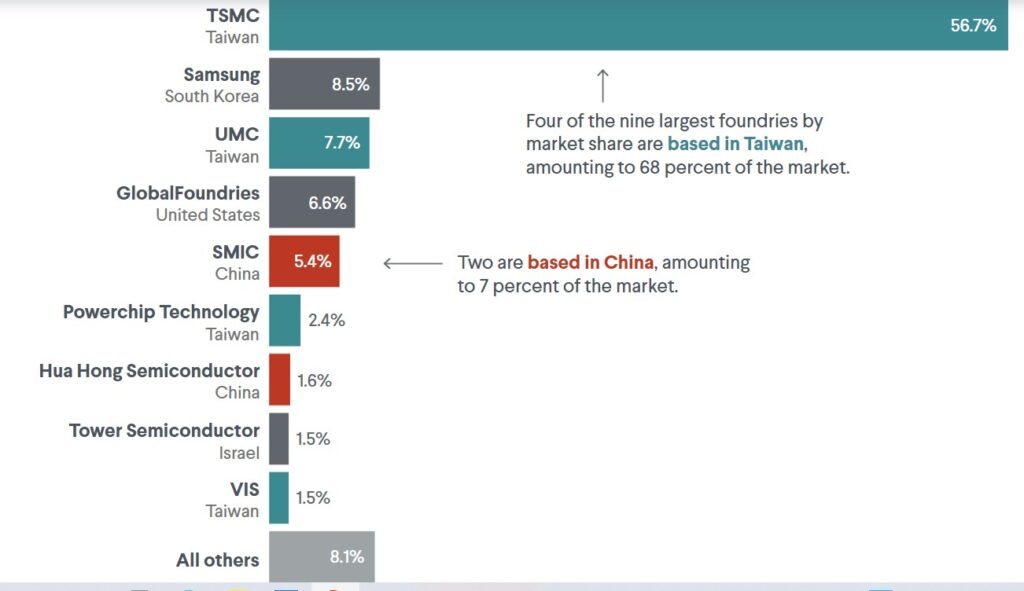
But the prevailing atmosphere has made our present moment more dangerous.
Challenges ahead
Political and societal division, both internationally and domestically.
In recent years we have seen a rise in populist extremism in many countries. But for this to happen in the US is very significant. For example, extremist views are found on both sides, the left as well as the right. Anything extreme is dangerous, we know that. But the percentage of Americans that belong to the so-called “bipartisan moderates” is still the majority. The problem is that they prefer to be silent, and afraid to go into the fray between the two extreme sides.
However, what seems to unite these two extremes is the anti-China sentiments. This is where I find the most ironic about the situation in the US. The anti-China rhetoric is rising fast, yet almost everywhere you see products made in China!
Because of this populist extremism, politicians are listening. They, too, must adopt this anti-China rhetoric. Which brings me to the next important point.
2024 is the year to watch
The year 2024 will be a very intense year. There will be a general election both in the US and in Taiwan. For sure, those to be elected as president and members of congress in the US would all (or almost) be anti-China. Meanwhile, in Taiwan, due to the current situation, the next administration would have to project strength and resolve before the Taiwanese population that to be under a communist China is not an option for them.
Taiwan is considered as the 2nd freest country in Asia, next only to Japan. And they are witnessed to what has been happening in Hong Kong when it became under China.
Those are two factors that will have a great impact as to China’s next move.
The emergence of advanced artificial intelligence
If there were instances in the past where World War III almost started because of computer glitches in nuclear weapons, it is understandable. After all, computers in the 70’s and 80’s are so antiquated compared to what we have today.
However, the fear is not about the possibility that glitches will happen. What is scarier is that the glitch would be intentional! Artificial Intelligence’s capabilities have been improving in leaps and bounds. What used to be years or months to make this happen is now – I don’t know – days or hours (?).
My own question
So, my lonely question is: Should the tension between the US and China – two nuclear superpowers – escalate into the level of threat of using the nukes, is there any assurance that some bad actors will not come into the picture and use AI to create some kind of “glitch”?
Geoffrey Hinton
Geoffrey Hinton, considered as one of the godfathers of A.I. is now waging a personal crusade urging government leaders around the world to urgently step in, and make sure that “machines do not take control of society”. Hinton quit his job at Google after working there for a decade, so he could speak freely on the dangers of A.I. This was right after ChatGPT was released, which captured the world’s imagination instantly.
James Cameron
James Cameron – the wizard behind such hit films as Titanic – is another prominent figure who is now speaking about the dangers posed by A.I. During one recent interview, he expressed honest concern that A.I. will lead to nuclear holocaust. “I think the weaponization of AI is the biggest danger,” he said. “I think that we will get into the equivalent of a nuclear arms race with AI, and if we don’t build it, the other guys are for sure going to build it, and so then it’ll escalate.” And he added, “You could imagine an AI in a combat theatre, the whole thing just being fought by the computers at a speed humans can no longer intercede, and you have no ability to deescalate.”
Of course, Cameron was also blowing his own horn. With a tinge of “I told you so”, he referenced his own hit film, The Terminator (starring Arnold Schwarzenegger). “I warned you guys in 1984 …and you didn’t listen.”
(By the way, James, I, Moore Onaim, listened to you. In fact, I wrote a blog piece on that one.)
A.I.’s enormous potential and its scary role in world conflict is very real. Especially when the road to Armageddon is just a code or a hack away.
Albert Einstein
Way back in 1949, in the aftermath of the Nagasaki and Hiroshima nuclear bombings, one of the most revered physicists, Albert Einstein, made his thought public about mankind’s future. He made a suggestion that the next war – World War III – would be unimaginable that it would revert mankind to the Stone Age. And when asked by a journalist what he thought would be the weapons World War III would be fought with, Einstein ominously made a bold prediction.
“I know not with what weapons World War III will be fought, but World War IV will be fought with sticks and stones.”
Meaning, in the aftermath of a nuclear World War III, there’s not much left.
Movie “Oppenheimer”
The movie “Oppenheimer” is not a war movie. It is not exactly about the atomic bomb. Rather, it is a human story, a true story of the life of the very man who was behind the success of the first nuclear bomb. It is about a man’s inner struggle in his conscience.
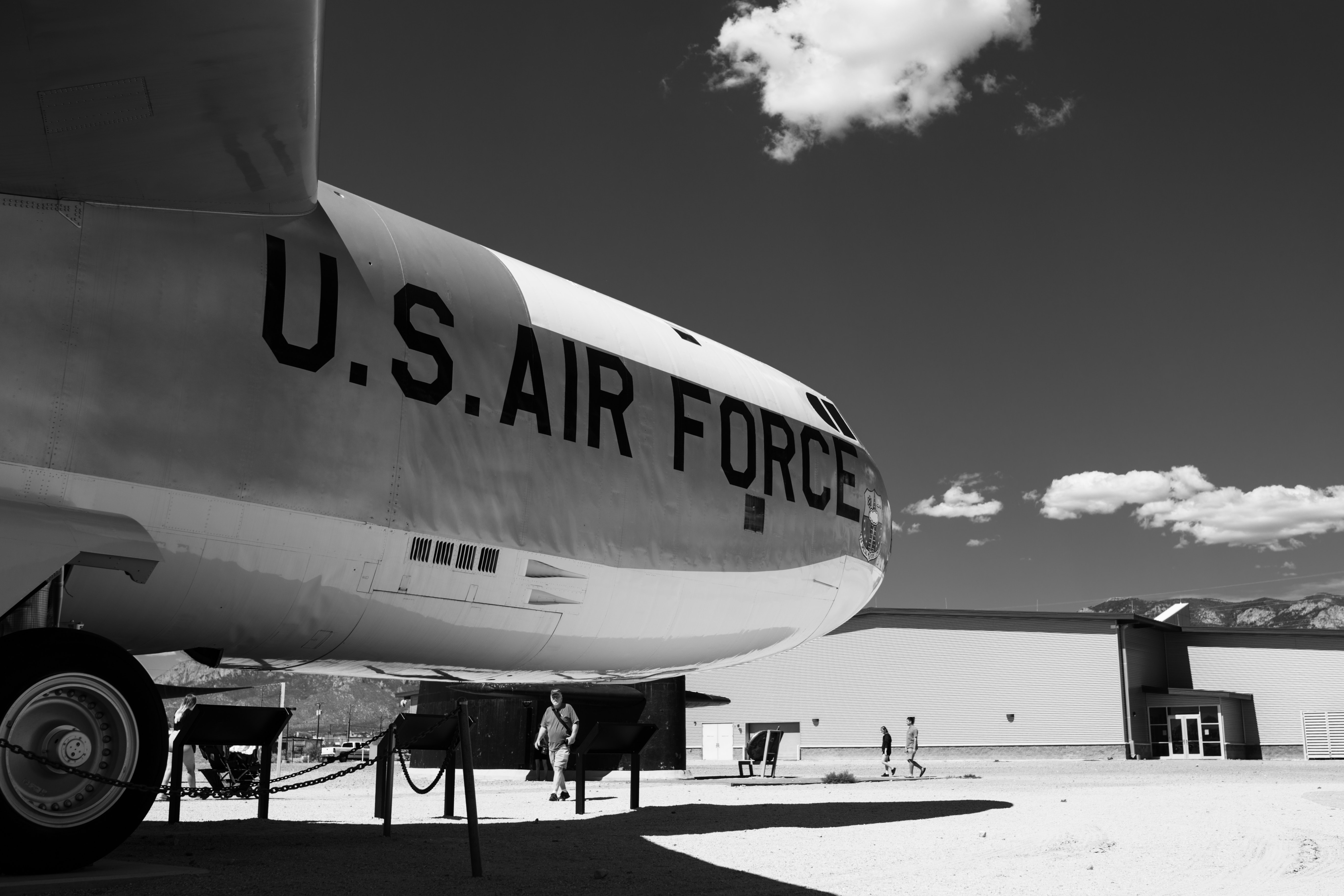
The real-life Oppenheimer
As the “father of the atomic bomb”, J. Robert Oppenheimer “spent the rest of his life fighting for international control of nuclear weapons and atomic energy, right up until his death …in 1967”. His plea fell on deaf ears.
After the success of the first atomic bomb, Oppenheimer uttered the words, quoting a Hindu scripture Bhagavad Gita,
“Now I am become death, the destroyer of worlds.”
My tiny hope
The next world war is inevitable. It is not a matter of if, but when. Humanity has had a penchant to wage war since the dawn of time. The bible itself is filled with war stories. It is my humble hope that it is delayed the longest time possible.
And who knows? The movie “Oppenheimer” might just have a ripple effect to those on whose hands depend the continued peace in the world.
What do you think of this post? Please share your thoughts by clicking on the underlined Let Me Know Your Thoughts below.



